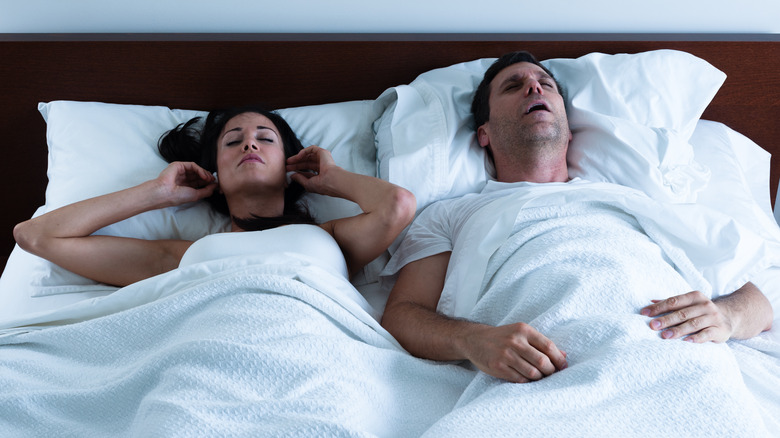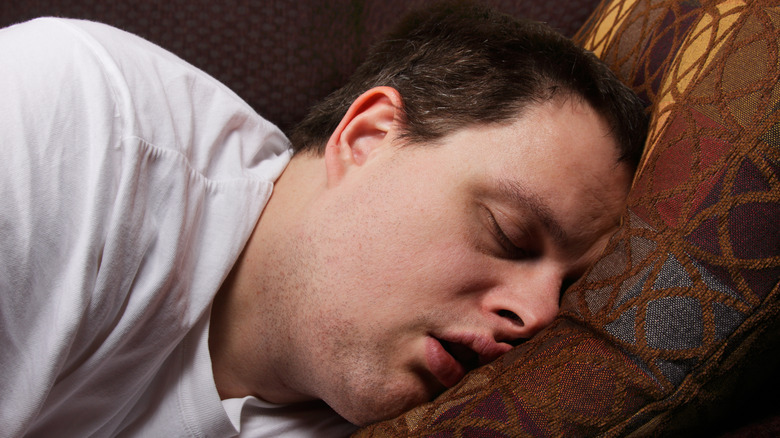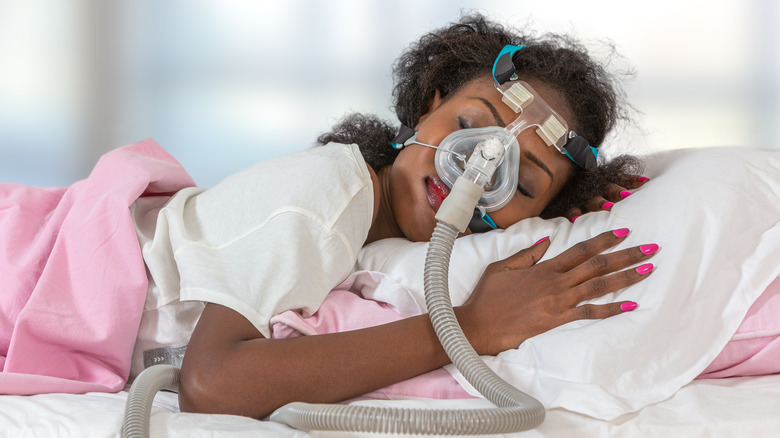What It Means When You Moan And Groan While Sleeping
Some of us may snore, murmur, or even talk in our sleep. Only a small number of people, however, are reported to moan and groan in their sleep. This rare health condition is known as catathrenia, according to the Sleep Foundation, and is estimated to affect as few as 0.17% of people with sleep issues.
The type of moaning associated with catathrenia isn't the type of mild, exasperated sigh you might be picturing. Rather, research from a 2017 scientific review published in the Journal of Clinical Sleep Medicine outlines how these moans and groans are exceptionally loud, one-note sounds emitted from the larynx as a person exhales due to vocal cord vibration. Catathrenia can affect both the patient and their sleeping partner. For the partner, the quality of sleep may be compromised due to the disturbance. For patients, the sounds themselves can be a source of embarrassment, as moans from this condition often resemble sounds associated with sexual activity.
Possible causes of catathrenia
Catathrenia groans may only last a couple of seconds in duration or go on for nearly a minute (via Sleep Foundation). Affecting both kids and adults, the cause of the condition is not entirely known. Those who have a family member with this particular sleep issue may be more susceptible to the condition. Abnormal neural activity in the brain region associated with breathing is another theory. People living with catathrenia also tend to share certain physical characteristics, such as a small jaw, smaller upper airways, and limitations in airflow.
Researchers from a 2011 case report published in the European Respiratory Journal conducted a laryngoscopy on a woman in her late 20s experiencing nighttime groaning and other occasional sleep issues. Study findings showed that while inhaling, the woman's glottis stayed open. Critical for both breathing and voice production, the glottis acts as a valve situated between the mouth and the lungs that expands, contracts, and vibrates (via ScienceDirect). When the woman exhaled, however, the glottis closed almost entirely, prompting a groaning sound.
Can anything be done about nighttime moans and groans?
While the exact cause of the woman's glottis closure was unclear, the researchers were able to effectively treat the woman with continuous positive airway pressure, or a CPAP machine. Researchers saw a substantial decrease in groan frequency and improvements in the woman's functioning during waking hours.
The Sleep Foundation reports that certain nighttime dental-like devices may also help alleviate catathrenia symptoms. In addition to using a CPAP machine or oral device, some people may benefit from surgically removing the tonsils and/or adenoids. Aside from medical interventions, try and prime yourself for sleep as best as possible. This includes creating a relaxing environment, keeping a consistent sleep schedule, and reducing the chances of disturbances from lights or sounds. A 2017 study published in Sleep Medicine found a strong correlation between catathrenia episodes and sleep disturbances that occurred just before, at the start of, or in the midst of a groan.
If you deal with moaning and groaning while sleeping — mainly if it affects your daytime functioning — be sure to speak to your healthcare provider. A sleep test and physical exam can help your doctor accurately diagnose the condition or identify any underlying causes.



